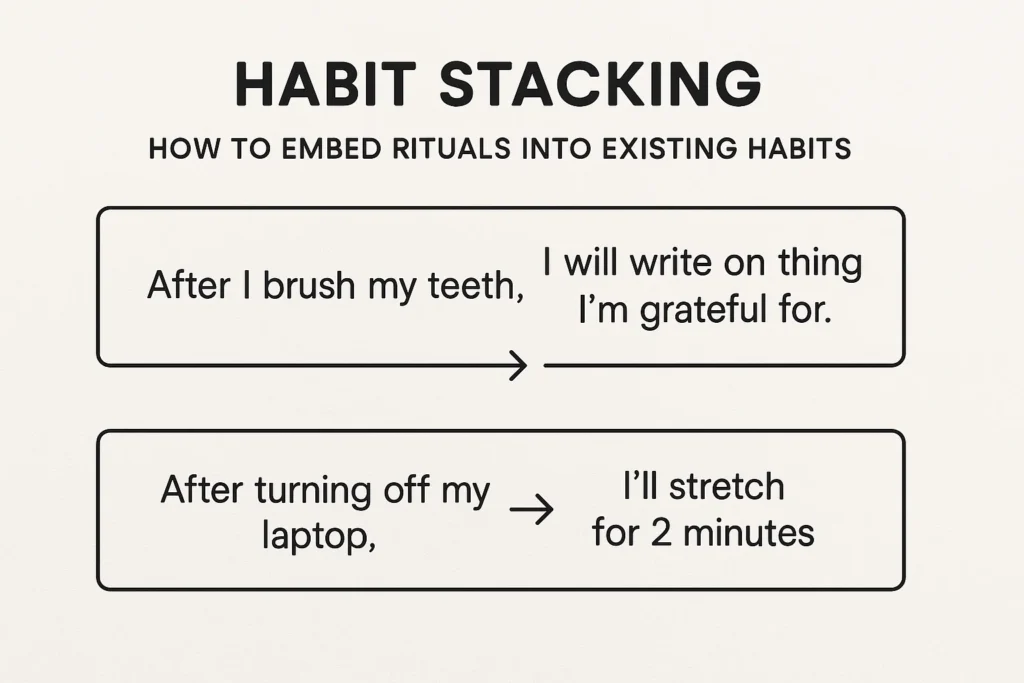Introduction
In a world where the majority of people are multitasking, going on a deadline, checking on notifications, and doing different tasks at the same time, it’s really hard to find the silence moment, many people have no time to experience peace. When we get up, before anything else, we have the habit of checking our phones, then we engage in a hectic day, and eventually drop dead to bed without attempting to figure out what just contracted our lives. A life is just a round of actions which are done randomly without any purpose.
But what if you could turn to simple, accessible ways to be present, to reduce stress, and to add more meaning to your daily life? The whole concept of daily rituals is there to take you through. It’s not about the complex or mystic things, no—rather, these are tiny yet meaningful habits that one regularly practices to stay realistic, to make one’s spirit high up, and to let one believe in his or her core values.
This paper is fully packed with the information about creating meaningful daily rituals that will not only play a role in improving your well-being but also enable you to live life with more intention and focus.

What Makes a Ritual “Meaningful”
We frequently have the terms “routine” and “ritual” as interchangeable synonyms, though in truth, they are two different things. Your daily routine is a set of behaviors that you perform regularly, the ones that you are used to and which you do easily, often because it is necessary. That brushing teeth or checking an email are of necessity because they don’t depend on anything else for which it happens frequently. On the other hand, rituals are mostly associated or filled with intention and the person’s full presence that makes it extra special. Thus, an ordinary time becomes a meaningful time, even without any religious undertone, but just the fact that its something vital.
A meaningful ritual is not only about the action the way that it is carried out plays a greater role. A cup of coffee becomes a ritual when you can manage to drink it with awareness, savor it with the aroma, and feel its warmth without having to do many things. Likewise, a walk is transformed into a ritual only after it becomes a moment when you leave behind the gadget for a while and connect again with nature.
Research advocates for the need of rituals for healing emotionally. Psychologists note that rituals not only reduce anxiety but also bring about emotional and social wellness by fostering a sense of belonging. They are a source of safety and certainty, which is especially crucial in tumultuous times.
To have a meaningful daily ritual means you can regularly take a break from your busy life, keeping your emotions in check, and digesting habits which are in line with your personal goals.
Key Benefits of Daily Rituals
1. Promotes Mindfulness and Self-Connection
Right in the middle of the day, you have the opportunity to engage in some small rituals, which are the habits of affirmation and self-discovery that might generally be ignored. You gain that self-love and affection when you take charge of your inner self.
2. Creates Structure Without Rigidity
It’s the regular practice of rituals in your daily routine which gives you a balanced approach to life – the act of centering yourself through which you achieve mental clarity, connection, and peace, and at the same time maintain reality without material attachment. They facilitate a natural rhythm of your day by allowing the flow between your everyday activities and your inner self-guided direction to happen.
3. Boosts Productivity by Reducing Decision Fatigue
When you use the same such meaningful parts of the day over and over again, your brain doesn’t use much energy, and you get exhausted less. This technique is utilized by businesspeople and great performers who decrease the workload of their memory.
4. Encourages Emotional Wellness and Gratitude
Working with the right rituals that are impactful by nature and are consist of thanks, positive emotion, or promise-making makes it possible for you to feel calmer, cheer up your mood, and to keep in a good mental state in the long run.
Morning Routine Suggestions
Morning is the time when you make the most out of your day. It is not necessary to have long and complicated but to be meaningful, it has to be thoughtfully planned.
A Few Examples of Simple Morning Rituals
- Journaling: Five minutes of writing down your thoughts, dreams, or intentions can be beneficial for you.
- Silent Tea/Coffee Time: Take your time having a cup of coffee or tea without gadgets. Enjoy the moment.
- Affirmation or Intention Setting: Tell or write down one positive statement for the day, e.g., “I am sure I can achieve….”
- Light Stretching or Breathwork: Just doing a few minutes of exercises or deep breathing can activate your body and clear your mind.
Steps to Ensure Your Regular Practice
- Announce it: Set the lowest bar for yourself and start with a 5-10 minute ritual and gradually advance.
- Lock It: Introduce your principle to an action that is already in your daily routine (e.g., after getting out of the bed, stretch).
- And It’s Just for You: The activities that mean something to you, do not choose those, which look only good on Instagram.
Evening Rituals
The evening time is great to relax and let go from the daily hassle. Integrating an evening ritual into your regular schedule is like triggering a switch in both your body and mind from a state of alertness to rest and relax, which in flip facilitates sleep onset and reduces the probability of late-night anxiety feelings.
Evening Ritual Examples
- Digital Detox: Turn off any gadgets at least half an hour before the moment you go to sleep.
- Reflection Journaling: State what was your best experience today and write what makes you feel grateful.
- Scent or Candle Rituals: Burn a candle or use essential oils to make your body know that it is time for relaxation and rest.
- Slow Reading: Choose a book that inspires or calms you, and read without any interruptions.

Why They Work
Adapting Rituals to Your Lifestyle
Rituals are not of a single size but are a personal thing. The things that are effective for a college student might be completely ineffective for a parent of three. The main point is to create rituals that suit your lifestyle and that are also impactful and effective.
For Busy Professionals
- Mini Rituals: Utilize intervals of transit like for instance charm or other for a quick breathing practice of a minute or simply check-in for an intention.
- Weekly Rituals: Should you find that a daily commitment is too much, go for weekly rituals such as the Sunday reset or planning session. That seems to be a bit more reasonable.
For Parents
- Family Rituals: The above passage talked about people with families. Here are some examples of rituals to practice on a daily basis: group activities like storytime, bedtime gratitude circles, and shared meals with mindful conversation.
- Solo Micro-Rituals: (Certain) simple rituals practiced individually like a short meditation during a shower (which needs less than) three minutes can help people feel calm even in the middle of their busiest days.
For Students
- Desk Rituals: Set 2 minutes every time for tidying up your desk, deciding your tasks, and lighting a candle in a specific order.
- Movement Rituals: Boost your focus by engaging in 5 jumping jacks or a brisk walk before starting to study.
Avoiding the “Perfect Ritual” Trap
The most meaningful rituals are usually those that get completely overlooked in favor of the ones that have been professionally curated. Social media may give the impression that good looking rituals are the best but actually, the more chaotic it is, the deeper the experience. What you do must not look good but be satisfying to you.
How To Keep On Track With Your Rituals
Putting in place meaningful daily rituals seems quite manageable–but keeping up the good work is a different story. Here are a few tips for those who want to have their rituals last long:
Use Habit Stacking
Connect a new ritual with a pre-existing one. For example, “Once I finish brushing my teeth, I’ll sit quietly for two minutes.”
Keep It Flexible
Life can sometimes be unpredictable. Let your rituals be to some extent flexible instead of being completely rigid and avoid breaking under stress.
Measure the Emotional Impact
Instead of checking the time or the number of times you practiced the ritual, check the feelings the ritual gives to you. Keeping a journal about these will help you stay on your path despite times when you feel down.
Practice Self-Compassion
Forgetting a ritual does not mean you have failed. It is rather a mechanism for embracing the truth, making the necessary adjustments and taking a step forward without guilt.

Concluding
You won’t have to redesign your life if you want to lead a more intentional life. All it needs is to seize a small part of your day and embed it with focus and purpose. This is where the power of a ritual reveals itself–just by making a simple thing quite extraordinary.
Start by selecting one area of your day—be it in the morning, evening, or transitional times—and look for a habit that you find meaningful. Be patient. Be consistent. And most importantly, be compassionate to yourself on this path.
Through the formation of meaningful daily rituals, you’re leaving behind the old days with endless to-dos and are, in actuality, bringing intentionality to your life, one small step at a time.